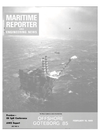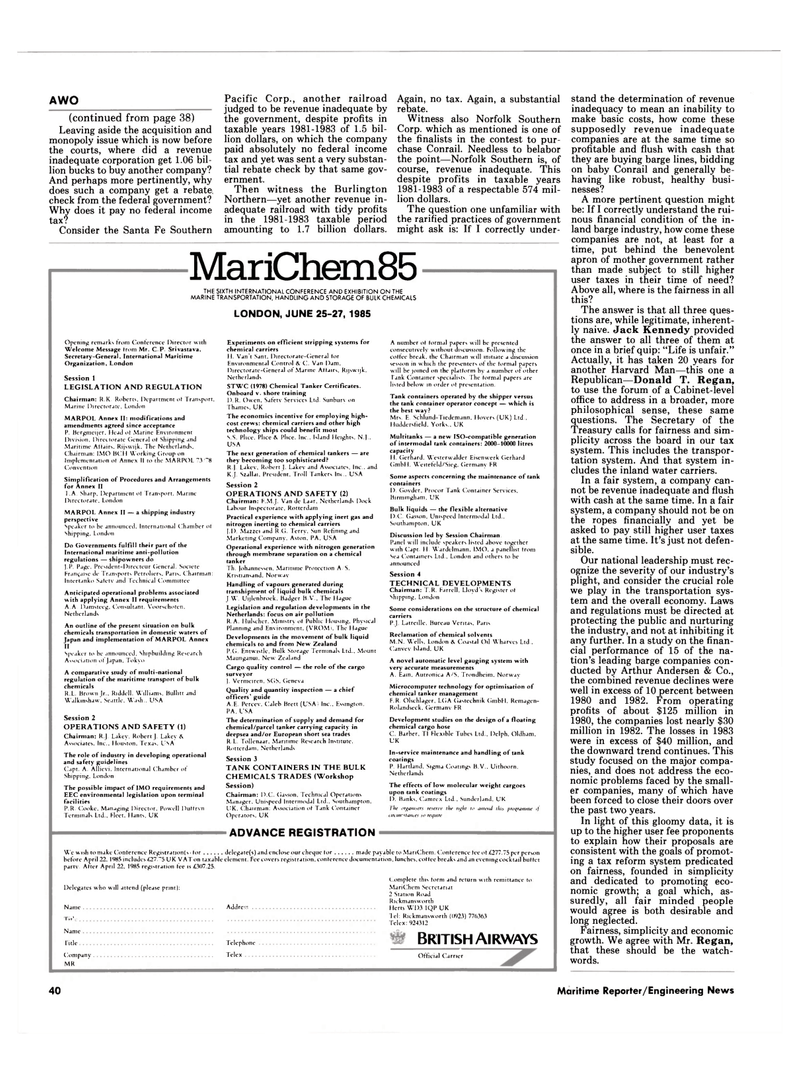
Page 40: of Maritime Reporter Magazine (February 15, 1985)
Read this page in Pdf, Flash or Html5 edition of February 15, 1985 Maritime Reporter Magazine
AWO (continued from page 38)
Leaving aside the acquisition and monopoly issue which is now before the courts, where did a revenue inadequate corporation get 1.06 bil- lion bucks to buy another company?
And perhaps more pertinently, why does such a company get a rebate; check from the federal government?
Why does it pay no federal income tax?
Consider the Santa Fe Southern
Opening remarks from Conference Director with
Welcome Message from Mr. C.P. Srivastava,
Secretary-General, International Maritime
Organization, London
Session 1
LEGISLATION AND REGULATION
Chairman: R.K. Roberts, Department of Transport,
Marine Directorate, London
MARPOL Annex II: modifications and amendments agreed since acceptance
P. Bergmeijer. Head of Marine Environment
Division, Directorate General of Shipping and
Maritime Affairs, Rijsvvijk, The Netherlands,
Chairman: IMO BCH Working Group on
Implementation of Annex II to the MARPOL 73/78
Convention
Simplification of Procedures and Arrangements for Annex II
T.A. Sharp, Department of Transport. Marine
Directorate, London
MARPOL Annex II — a shipping industry perspective
Speaker to be announced. International Chamber of
Shipping, London
Do Governments fulfill their part of the
International maritime anti-pollution regulations — shipowners do
J.P. Page. President-Directeur General. Societe
Franchise de Transports Petroliers, Paris. Chairman:
Intertanko Safety and Technical Committee
Anticipated operational problems associated with applying Annex II requirements
A. A. Damsteeg. Consultant. Voorschoten.
Netherlands
An outline of the present situation on bulk chemicals transportation in domestic waters of
Japan and implementation of MARPOL Annex
II
Speaker to be announced. Shipbuilding Research
Association of Japan, Tokyo
A comparative study of multi-national regulation of the maritime transport of bulk chemicals
R.L. Brown Jr.. Riddell. Williams. Bullitt and
Walkinshaw. Seattle. Wash.. USA
Session 2
OPERATIONS AND SAFETY (1)
Chairman: R.J. Lakey. Robert J. Lakey &.
Associates, Inc., Houston. Texas. USA
The role of industry in developing operational and safety guidelines
Capt. A. Allievi, International Chamber of
Shipping, London
The possible impact of IMO requirements and
EEC environmental legislation upon terminal facilities
P.R. Cooke, Managing Director, Powell Duffrvn
Terminals Ltd., Fleet. Hants. UK
Pacific Corp., another railroad judged to be revenue inadequate by the government, despite profits in taxable years 1981-1983 of 1.5 bil- lion dollars, on which the company paid absolutely no federal income tax and yet was sent a very substan- tial rebate check by that same gov- ernment.
Then witness the Burlington
Northern—yet another revenue in- adequate railroad with tidy profits in the 1981-1983 taxable period amounting to 1.7 billion dollars.
LONDON, JUNE 25-27, 1985
Experiments on efficient stripping systems for chemical carriers
H. Van't Sant. Directorate-General tor
Environmental Control & C. Van Dam,
Directorate-General of Marine Affairs, Rijswijk,
Netherlands
STWC (1978) Chemical Tanker Certificates.
Onboard v. shore training
D.R. Owen, Safety Services Ltd. Sunburv on
Thames, UK
The economics incentive for employing high- cost crews: chemical carriers and other high technology ships could benefit most
S.S Plice, Plice & Plice. Inc.. Island Heights. N.)..
USA
The next generation of chemical tankers — are they becoming too sophisticated?
R.J. Lakev, Robert J. Lakey and Associates. Inc.. and
K.J. Szallai. President. Troll Tankers Inc.. USA
Session 2
OPERATIONS AND SAFETY (2)
Chairman: F.M.J. Van de Laar, Netherlands Dock
Labour Inspectorate, Rotterdam
Practical experience with applying inert gas and nitrogen inerting to chemical carriers
J.D. Mazzei and R.G. Terry, Sun Refining and
Marketing Company. Aston, PA, USA
Operational experience with nitrogen generation through membrane separation on a chemical tanker
Th. Johannessen. Maritime Protection A/S.
Kristiansand, Norwav
Handling of vapours generated during transhipment of liquid bulk chemicals
J W. Uijlenbroek. Badger B.V.. The Hague
Legislation and regulation developments in the
Netherlands: focus on air pollution
R.A. Hulscher, Ministry of Public Housing. Physical
Planning and Environment. (VROM), The Hague
Developments in the movement of bulk liquid chemicals to and from New Zealand
P.G. Entwistle, Bulk Storage Terminals Ltd., Mount
Maunganui, New Zealand
Cargo quality control — the role of the cargo surveyor
J. Vermeiren, SGS, Geneva
Quality and quantity inspection — a chief officers' guide
A.E. Percev. Caleb Brett (USA) Inc.. Essington.
PA. USA
The determination of supply and demand for chemical/parcel tanker carrying capacity in deepsea and/or European short sea trades
R.L. Tollenaar. Maritime Research Institute.
Rotterdam. Netherlands
Session 3
TANK CONTAINERS IN THE BULK
CHEMICALS TRADES (Workshop
Session)
Chairman: D.C. Gasson, Technical Operations
Manager, Unispeed Intermodal Ltd.. Southampton,
UK. Chairman: Association of Tank Container
Operators, UK -ADVANCE REGISTRATION
Again, no tax. Again, a substantial rebate.
Witness also Norfolk Southern
Corp. which as mentioned is one of the finalists in the contest to pur- chase Conrail. Needless to belabor the point—Norfolk Southern is, of course, revenue inadequate. This despite profits in taxable years 1981-1983 of a respectable 574 mil- lion dollars.
The question one unfamiliar with the rarified practices of government might ask is: If I correctly under-
A number of formal papers will be presented consecutively without discussion. Following the coffee break, the Chairman will initiate a discussion session in which the presenters of the formal papers will be joined on the platform by a number of other
Lank Container specialists. The formal papers are listed below in order of presentation.
Tank containers operated by the shipper versus the tank container operator concept — which is the best way?
Mrs. E. Schlund-Tiedemann, Hovers (UK) Ltd.,
Huddersfield, Yorks.. UK
Multitanks — a new ISO-compatible generation of intermodal tank containers: 2000-10000 litres capacity
H. Gerhard. Westerwalder Eisenwerk Gerhard
GmbH. Weitefeld/Sieg. Germany FR
Some aspects concerning the maintenance of tank containers
D. Govder, Procor Tank Container Services.
Birmingham, UK
Bulk liquids — the flexible alternative
D.C. Gasson, Unispeed Intermodal Ltd.,
Southampton, UK
Discussion led by Session Chairman.
Panel will include speakers listed above together with Capt. H. Wardelmann, IMO, a panellist from
Sea Containers Ltd., London and others to be announced
Session 4
TECHNICAL DEVELOPMENTS
Chairman: T.R. Farrell. Lloyd's Register of
Shipping, London
Some considerations on the structure of chemical carriers
P.J. Latreille. Bureau Veritas. Paris
Reclamation of chemical solvents
M.N. Wells, London & Coastal Oil Wharves Ltd..
Canvev Island, UK
A novel automatic level gauging system with very accurate measurements
A. Eain, Autronica A/S. Trondheim, Norway
Microcomputer technology for optimisation of chemical tanker management
F.R. Olschlager, LGA Gastechnik GmbFI. Remagen-
Rolandseck. Germanv FR
Development studies on the design of a floating chemical cargo hose
C. Barber. TI Flexible Tubes Ltd.. Delph, Oldham.
UK
In-service maintenance and handling of tank coatings
P. Flartland, Sigma Coatings B.V.. Uithoorn.
Netherlands
The effects of low molecular weight cargoes upon tank coatings
D. Banks. Camrcx Ltd.. Sunderland. UK
The organisers reserve the right to amend this programme if lircuifstames so require stand the determination of revenue inadequacy to mean an inability to make basic costs, how come these supposedly revenue inadequate companies are at the same time so profitable and flush with cash that they are buying barge lines, bidding on baby Conrail and generally be- having like robust, healthy busi- nesses?
A more pertinent question might be: If I correctly understand the rui- nous financial condition of the in- land barge industry, how come these companies are not, at least for a time, put behind the benevolent apron of mother government rather than made subject to still higher user taxes in their time of need?
Above all, where is the fairness in all this?
The answer is that all three ques- tions are, while legitimate, inherent- ly naive. Jack Kennedy provided the answer to all three of them at once in a brief quip: "Life is unfair."
Actually, it has taken 20 years for another Harvard Man—this one a
Republican—Donald T. Regan, to use the forum of a Cabinet-level office to address in a broader, more philosophical sense, these same questions. The Secretary of the
Treasury calls for fairness and sim- plicity across the board in our tax system. This includes the transpor- tation system. And that system in- cludes the inland water carriers.
In a fair system, a company can- not be revenue inadequate and flush with cash at the same time. In a fair system, a company should not be on the ropes financially and yet be asked to pay still higher user taxes at the same time. It's just not defen- sible.
Our national leadership must rec- ognize the severity of our industry's plight, and consider the crucial role we play in the transportation sys- tem and the overall economy. Laws and regulations must be directed at protecting the public and nurturing the industry, and not at inhibiting it any further. In a study on the finan- cial performance of 15 of the na- tion's leading barge companies con- ducted by Arthur Andersen & Co., the combined revenue declines were well in excess of 10 percent between 1980 and 1982. From operating profits of about $125 million in 1980, the companies lost nearly $30 million in 1982. The losses in 1983 were in excess of $40 million, and the downward trend continues. This study focused on the major compa- nies, and does not address the eco- nomic problems faced by the small- er companies, many of which have been forced to close their doors over the past two years.
In light of this gloomy data, it is up to the higher user fee proponents to explain how their proposals are consistent with the goals of promot- ing a tax reform system predicated on fairness, founded in simplicity and dedicated to promoting eco- nomic growth; a goal which, as- suredly, all fair minded people would agree is both desirable and long neglected.
Fairness, simplicity and economic growth. We agree with Mr. Regan, that these should be the watch- words.
We ish to make Conference Registration! s • for delegate(s) and enclose our cheque tor made payable to MariChem. Conference tee ot £277.75 per person before April 22. 1985 includes £27 "5 UK VAT on taxable element. Fee covers registration, conference documentation, lunches, coffee breaks and an evening cocktail buffet partv. After April 22, 1985 registration fee ts £307.25. ( omplete this form and return with remittance to
Delegates who will attend (please print): MariChem Secretariat 2 Station Road
RIL kmansworth
Name Address Herts WD3 1QP UK
T , lei: Rickmaimvorth (0923) 776363
Telex: 924312
Name 1'itle Telephone
Company Telex Official Carrier
MR
BRITISH AIRWAYS
MariChem85
THE SIXTH INTERNATIONAL CONFERENCE AND EXHIBITION ON THE
MARINE TRANSPORTATION, HANDLING AND STORAGE OF BULK CHEMICALS 40 Maritime Reporter/Engineering News

 39
39

 41
41
